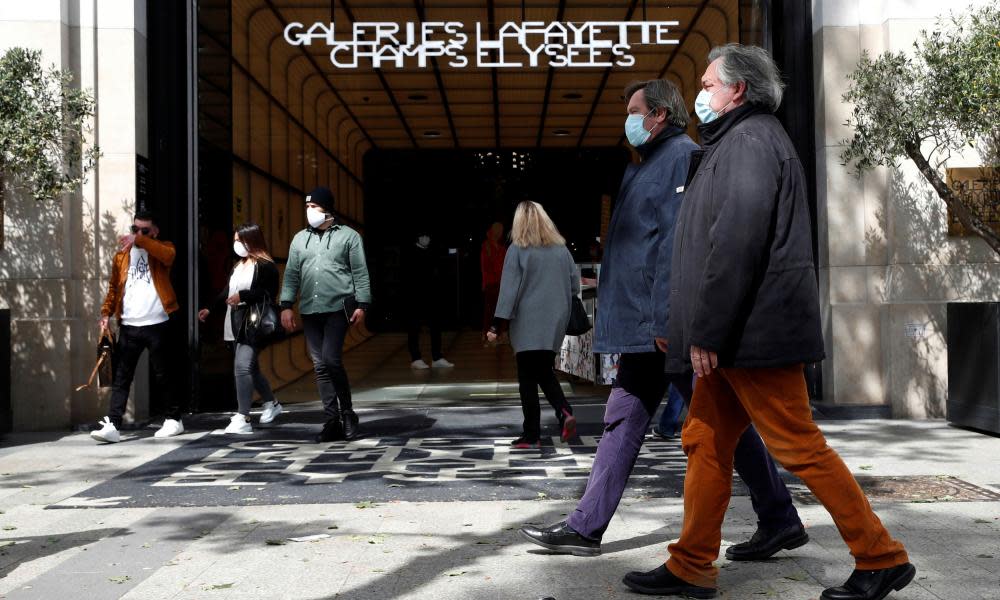'What’s the point?': Paris fashion faces up to life after lockdown

Since shops reopened in France last week, luxury fashion boutiques in the French capital have been revamping their security measures to create a transformed high-end experience.
In one of the first countries in Europe to open for consumers to such an extent, luxury destinations are becoming self-aware pioneers in inventing a new shopping environment. The challenge is “to make people today feel charmed as much as safe”, says Jennifer Cuvillier, the head of style at the department store Le Bon Marché – no small challenge in the context of global luxury sales projected to drop by 50% this year, according to a recent report by Baines.
Shoppers are welcomed to Le Bon Marché by an eerily masked and gloved army of staff – 150 to be precise, one for each visitor at the store’s maximum capacity in these post-confinement days. A shop assistant privately chaperones visitors through the almost invariably glass-shielded displays.
In an ambience lodged between a museum visit and a dystopian sci-fi movie, they follow the mandatory curated route so as to avoid any potential physical contact. The tills are shielded by acrylic screens, such as at Chanel on Rue Cambon.
The majority of the shops disinfect and quarantine any item that has been touched, for 48 to 72 hours. And, of course, the changing rooms are sanitised after every use. To counter these rather daunting measures, brands seem to be focusing on offering personalised and upgraded services: luxury labels including Louis Vuitton and Christian Dior have begun offering private shopping sessions.
All the efforts notwithstanding, a week after doors reopened, the initial rush seems to have faded. While on 11 May, crowds flocked to the boutiques on the Champs Élysées and Avenue Montaigne – a seemingly endless line of luxury-hungry shoppers awaiting the opening of Louis Vuitton – the situation has radically changed: Chanel, Céline and Yves Saint Laurent are all queue-less a week later, and the boutiques almost empty. Sales assistants at Galeries Lafayette Champs Élysées and Loewe both confirmed traffic had fallen significantly.
“There was an initial craze that didn’t last,” notes Rémy Faure, a hair colourist. “One of my clients went straight out on the 11th to buy an electric-blue Kelly bag at Hermès. But a lot of people have started thinking more critically about their life choices and needs during the confinement.”
Serge Carreira, a fashion lecturer at the Paris Institute of Political Studies, says: “With the absence of tourists, who make up the large majority of luxury sales, boutiques are empty.”
Shopping is not going away, he says, but it is changing: “Those who shop will do it differently, more determinately; it won’t be a heat of the moment decision but something thought out.”
Coming out of Galeries Lafayettes Champs Élysées, Samantha, 34, and Elena, 33, suggest that the slump in shopping is down to the fact that there is nowhere to show off any new outfits. “À quoi bon?” (What’s the point?) grumbles Samantha. Theatres, cinemas, restaurants, cafes and bars are closed. “The only places to visit are shops,” adds Elena, for whom lèche-vitrine (literally “window licking”, as the French call browsing) is one of the few outdoor activities available in the city now.
According to Carreira, the slowness could be due to habits gained in the lockdown: “Shopping addicts shopped as much as they could during the confinement, many people have adopted the habit and, one can assume, don’t see the point of going out to a city still with a ghost-like feeling.”


